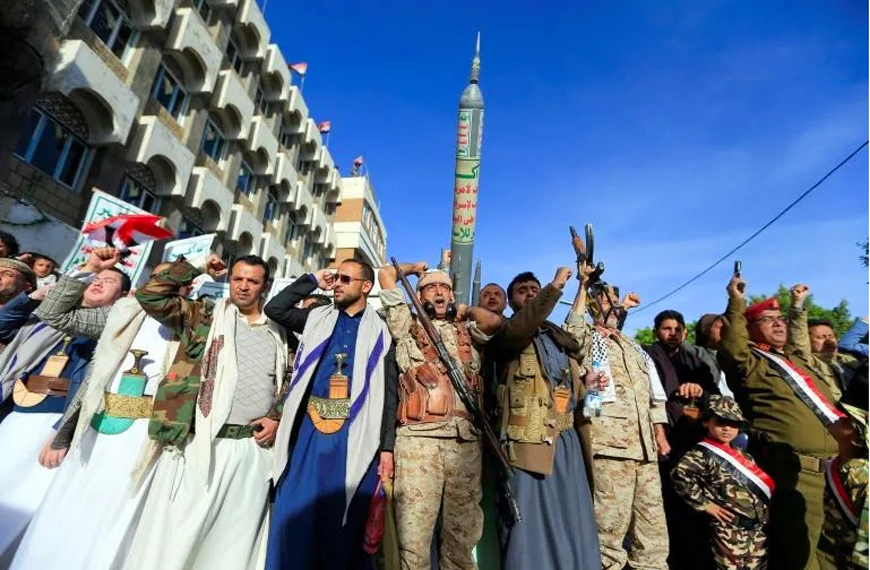SANAA — Yemen rebels fired missiles at the United Arab Emirates and Saudi Arabia, with coalition forces hitting back by blowing up the insurgents' launchpad as a sharp escalation of hostilities entered a second week on Monday.
Witnesses saw bright flashes arcing over the Emirati capital Abu Dhabi in the early hours of Monday as two ballistic missiles were intercepted, scattering debris.
Nobody was hurt in the attack, which came a week after the Iran-backed Huthi rebels killed three people in a drone and missile assault on the city, triggering a volley of deadly air strikes on Yemen.
Separately, missiles were fired on Saudi Arabia in regions bordering Yemen, with two people wounded in Jazan, and another missile intercepted over Dhahran Al-Janub.
The kingdom's foreign ministry on Monday condemned the latest attacks, calling on the international community "to put an end to this hostile behaviour".
The UAE said an F16 fighter jet destroyed a Huthi missile launcher in Al-Jawf in northern Yemen at 4:10 am (0110 GMT), "immediately after it launched two ballistic missiles at Abu Dhabi".
Abu Dhabi released a black-and-white video of the attack in Yemen, showing an explosion followed by a large fire that sent up plumes of thick smoke.
UAE presidential adviser Anwar Gargash stressed the UAE's resilience against such attacks, tweeting that the Emirates was "an impenetrable dam against forces of darkness and terrorism".
The 57-member Organisation of Islamic Cooperation (OIC) also condemned the attacks on the UAE and Saudi Arabia.
‘Expand the operation’
The UAE, part of the Saudi-led coalition fighting the Houthis in Yemen, is “ready to deal with any threats” and is “taking all necessary measures to protect the state from all attacks”, the defence ministry said.
The seven-year conflict, which has killed more than 150,000 people and displaced millions according to the United Nations, entered a dangerous new phase over the past week.
After last Monday’s attack, the rebels threatened to ramp up their targeting of UAE, and repeated their warning for foreign companies to leave the oil, business, transport and tourism hub.
“We are ready to expand the operation during the next phase and confront escalation with escalation,” rebel military spokesman Yahya Saree said in a televised statement.
He said the Houthis targeted Abu Dhabi’s Al Dhafra Air Base, which hosts Emirati, US and French forces, as well as “vital and important” locations in the Dubai area. The UAE did not report an attack on Dubai.
Houthi spokesman Mohammed Abdulsalam warned in a televised interview Monday the rebels would target UAE military and economic institutions if it “does not stop its blatant interference” in Yemen.
“Designating [the Houthi militia] as a terrorist organisation has no value and will never affect the course of battle,” he added.
New front
While the rebels have frequently attacked Saudi Arabia, the UAE is a new front in a conflict that also threatens the busy Red Sea shipping route.
Earlier this month, after being driven back by UAE-trained forces in a key province in Yemen, the Houthis hijacked a UAE-flagged ship in the Red Sea, saying it was carrying weapons.
But last week’s Abu Dhabi attack,the first deadly assault on UAE soil acknowledged by the Emiratis and claimed by the Houthis, was a shock for the UAE, usually an oasis of calm in the often volatile region.
The US embassy in the UAE issued a statement Monday urging its citizens in the Gulf country “to maintain a high level of security awareness”.
Abu Dhabi lies about 1,500 kilometres northeast of Yemen’s rebel-held capital Sanaa.
Reprisals were swift and severe. Fourteen people died in an air raid on Sanaa, and at least three children were killed in an attack on Hodeida that also plunged the country into an Internet blackout.
The coalition denied carrying out a strike on a prison in the northern city of Saada, the rebels’ home base, that killed at least 70 people and wounded more than 100.
Aid agencies dismissed the coalition’s denial, however, saying that witnesses in Saada heard fighter jets overhead, followed by three loud explosions.
